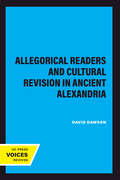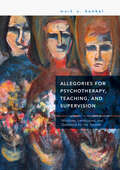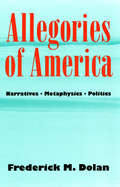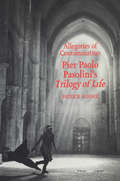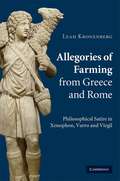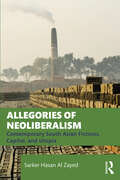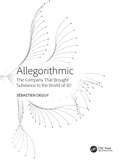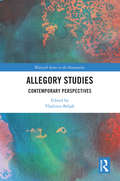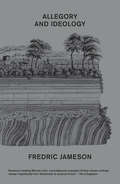- Table View
- List View
Allegiance: Star Wars (Star Wars - Legends)
by Timothy ZahnNever before has the incendiary mix of action, politics, and intrigue that has become Timothy Zahn's trademark, been mmore evident that in this new Star Wars epic. On the heels of the stunning events chronicled in Star Wars: A New Hope, the newly minted heroes of the Rebellion-fledgling Jedi Luke Skywalker, smuggler turned reluctant freedom-fighter Han Solo, and Princess Leia Organa, a bold leader with a world to avenge-must face the harsh realities of the cataclysmic conflict into which they have so bravely plunged. From this point forward, legends will grow, treachery will abound, and lives will be irrevocably altered, in the long, hard fight to counter the fist of tyranny and restore hope to a galaxy too long in darkness. The destruction of the Death Star by the Rebel Alliance was a decisive blow against the Empire, but Palpatine and his monstrous enforcer, Darth Vader, are no less of a threat. The brutal extermination of Alderaan not only demonstrated the magnitude of their murderous power, but served as a chilling testament to their resolve to crush the Rebel uprising. Standing against them, Skywalker, Solo, and the Princess remain uncertain opponents. Luke is gifted and brave, but unschooled in the power he possesses. Han has doubts about waging someone else's war-and his contentiousness is one more burden for Leia to bear as she struggles to help keep the Rebellion alive. The three have been sent to mediate a dispute between Rebel Alliance factions in Shelsha Sector-agitating matters by forcing Han to deal not only with pirates, but with his more dreaded enemy, politics. At the same time, Mara Jade-all of eighteen and years away from her fateful meeting with Luke-is serving her evil master, Palpatine, well in her role as the Emperor's Hand: tracking suspected treachery in the Empire to what may be high places-while trying to stay out of Darth Vader's way.But the Rebels will prove to be only one of the Empire's concerns. For Imperial Stormtrooper Daric LaRone, his faith in the Empire shaken by the wanton destruction of Alderaan, will commit a sudden and violent act of defiance, and take four other enforcers with him, in a desperate bid to elude their masters' wrath.Each of these fateful actions, whether sanctioned, secret, or scandalous, will expose brutality and corruption, spur upheavals destined to shake the Empire to its core, and shape momentous events yet to come. Features a bonus section following the novel that includes a primer on the Star Wars expanded universe, and over half a dozen excerpts from some of the most popular Star Wars books of the last thirty years!
Allegiances (The Battling McGuire Boys #6)
by Cynthia EdenAn old enemy returns...with a new victim in the conclusion of The Battling McGuire Boys by New York Times bestselling author Cynthia Eden Private investigator Sullivan "Sully" McGuire has a reputation for danger. He's spent most of his life tracking the men who murdered his parents. The one woman who sees past Sully's predatorial pursuit is the wife he abandoned years ago. But Celia James has returned, this time with a target on her back. In order to save Celia, Sully is forced to resurrect old demons. New dangers-and dormant desires-bring Sully and Celia closew...and old enemies even closer.
Allegiances: Allegiances Urgent Pursuit Smoke And Ashes (The Battling McGuire Boys #6)
by Cynthia EdenAn old enemy returns in the beloved conclusion of The Battling McGuire Boys by New York Times bestselling author Cynthia Eden, originally published by Harlequin Intrigue in 2016.Private investigator Sullivan “Sully” McGuire has a reputation for danger. He’s spent most of his life tracking the men who murdered his parents. The one woman who sees past Sully’s predatorial pursuit is the wife he abandoned years ago. But Celia James has returned, this time with a target on her back. In order to save Celia, Sully is forced to resurrect old demons. New dangers—and dormant desires—bring Sully and Celia close…and old enemies even closer.
Allegiant (Divergent Series #3)
by Veronica RothNow includes an excerpt from the upcoming Four: A Divergent Collection.What if your whole world was a lie? What if a single revelation--like a single choice--changed everything? What if love and loyalty made you do things you never expected?The explosive conclusion to Veronica Roth's #1 New York Times bestselling Divergent trilogy reveals the secrets of the dystopian world that has captivated millions of readers in Divergent and Insurgent.
Allegiant Collector's Edition
by Veronica RothThe stunning conclusion to the #1 New York Times bestselling Divergent series is now available in a collector's edition featuring 48 pages of bonus content, including: Excerpts from Natalie Prior's journal Two deleted scenes with commentary from Veronica Roth Favorite quotes from Allegiant, illustrated by fellow Initiates Allegiant discussion questionsThe Allegiant Collector's Edition is perfect for established fans who want to expand their Divergent library as well as fans of the feature films starring Shailene Woodley, Theo James, and Kate Winslet. The third book in Veronica Roth's worldwide bestselling Divergent trilogy, Allegiant reveals the secrets of the dystopian world that captivated millions of readers in Divergent and Insurgent.
Allegorical Bodies
by Daisy DeloguAllegorical Bodies begins with the paradoxical observation that at the same time as the royal administrators of late fourteenth and early fifteenth-century France excluded women from the royal succession through the codification of Salic law, writers of the period adopted the female form as the allegorical personification of France itself. Considering the role of female allegorical figures in the works of Eustache Deschamps, Christine de Pizan, and Alain Chartier, as well as in the sermons of Jean Gerson, Daisy Delogu reveals how female allegories of the Kingdom of France and the University of Paris were used to conceptualize, construct, and preserve structures of power during the tumultuous reign of the mad king Charles VI (1380-1422).An impressive examination of the intersection between gender, allegory, and political thought, Delogu's book highlights the importance of gender to the functioning of allegory and to the construction of late medieval French identity.
Allegorical Form and Theory in Hildegard of Bingen’s Books of Visions (The New Middle Ages)
by Dinah WoutersThis book analyses how the three books of visions by Hildegard of Bingen use the allegorical vision as a form of knowledge. It describes how the visionary’s use of allegory and allegorical exegesis is linked to theories of cognition, interpretation, and prophecy. It argues that the form of the allegorical vision is not just the product of a medieval symbolic mentality, but specific to Hildegard’s position and the major transformations taking place in the prescholastic intellectual milieu, such as the changing use of Scripture or the shift from traditional hermeneutics to cognitive language philosophy. The book shows that Hildegard uses traditional forms of knowledge – prophecy, the vision, monastic theology, allegorical hermeneutics – in startlingly innovative ways by combining them and by revising them for her own time.
Allegorical Moments: Call to the Everyday
by Lyn HejinianAllegorical Moments is a set of essays dedicated to rethinking allegory and arguing for its significance as a creative and critical response to sociopolitical, environmental, and existential turmoil affecting the contemporary world. Traditionally, allegorical interpretation was intended to express an orthodoxy and support an ideology. Hejinian attempts to liberate allegory from its dogmatic usages. Presenting modern and contemporary materials ranging from the novel to poetry to painting and cinema to activist poetry of the Occupy movement, each essay in the book "begins again" with different materials and from different perspectives. Hejinian's generative scholarship looks back to experimental modernism and forward into a future for a vital, wayward poetry resistant to the crushing global effects of neoliberalism.
Allegorical Readers and Cultural Revision in Ancient Alexandria
by David DawsonAllegorical readings of literary or religious texts always begin as counterreadings, starting with denial or negation, challenging the literal sense: "You have read the text this way, but I will read it differently." David Dawson insists that ancient allegory is best understood not simply as a way of reading texts, but as a way of using non-literal readings to reinterpret culture and society. Here he describes how some ancient pagan, Jewish, and Christian interpreters used allegory to endorse, revise, and subvert competing Christian and pagan world views.This reassessment of allegorical reading emphasizes socio-cultural contexts rather than purely formal literary features, opening with an analysis of the pagan use of etymology and allegory in the Hellenistic world and pagan opposition to both techniques. The remainder of the book presents three Hellenistic religious writers who each typify distinctive models of allegorical interpretation: the Jewish exegete Philo, the Christian Gnostic Valentinus, and the Christian Platonist Clement. The study engages issues in the fields of classics, history of Christianity and Hellenistic Judaism, literary criticism and theory, and more broadly, critical theory and cultural criticism.
Allegories for Psychotherapy, Teaching, and Supervision: Windows, Landscapes, and Questions for the Traveler
by Mark A. KunkelThis book explores the practice of psychotherapy, teaching, and supervision via allegory, metaphor, and myth. Based upon the author’s own extensive teaching and practice, Mark Kunkel takes the reader through a series of vignettes that are windows not only into reality, but also into the soul. The author's approach reflects his vocational commitment to an integration of conceptualization, affective involvement, and application. These allegories, parables, and myths serve to clarify and open important issues in teaching, psychotherapeutic, and clinical supervisory settings, and are intended to be allies in individual study and group discussion alike.
Allegories of America: Narratives, Metaphysics, Politics (Contestations)
by Frederick M. DolanAllegories of America offers a bold idea of what, in terms of political theory, it means to be American. Beginning with the question What do we want from a theory of politics? Dolan explores the metaphysics of American-ness and stops along the way to reflect on John Winthrop, the Constitution, 1950s behavioralist social science, James Merrill, and William Burroughs.The pressing problem, in Dolan's view, is how to find a vocabulary for politics in the absence of European metaphysics. American political thinkers, he suggests, might respond by approaching their own theories as allegories. The postmodern dilemma of the loss of traditional absolutes would thus assume the status of a national mythology—America's perennial identity crisis in the absence of a tradition establishing the legitimacy of its founding.After examining the mid-Atlantic sermons of John Winthrop, the spiritual founding father, Dolan reflects on the authority of the Constitution and the Federalist. He then takes on questions of representation in Cold War ideology, focusing on the language of David Easton and other liberal political "behaviorists," as well as on cold War cinema and the coverage of international affairs by American journalists. Additional discussions are inspired by Hannah Arendt's recasting of political theory in a narrative framework. here Dolan considers two starkly contrasting postwar literary figures—William S. Burroughs and James Merrill—both of whom have a troubled relationship to politics but nonetheless register an urgent need to articulate its dangers and opportunities. Alongside Merrill's unraveling of the distinction between the serious and the fictive, Dolan assesses the attempt in Arendt's On Revolution to reclaim fictional devices for political reflection.
Allegories of Contamination
by Patrick RumbleThe Trilogia della vita (Trilogy of Life) is a series of three films that Pier Paolo Pasolini completed before his horrifying assassination in 1975, and it remains among the most controversial of his cinematic works. In Allegories of Contamination Patrick Rumble provides an incisive critical and theoretical study of these films and the Marxist filmmaker's complex, original concept of the cinematic medium.With the three films that make up the Trilogy of Life - The Decameron, Canterbury Tales, and The Arabian Nights - Pasolini attempts to recapture the aura surrounding popular, predominantly oral forms of storytelling through a pro-modern vision of innocent, unalienated bodies and pleasures. In these works Pasolini appears to abandon the explicitly political engagement that marked his earlier works - films that led him to be identified with other radical filmmakers such as Bellocchio, Bertolucci, and Godard. However, Pasolini insisted that these were his 'most ideological films,' and his political engagement translates into a mannerist, anti-classical style or what he called a 'cinema of poetry.' Rumble offers a comparative study based on the concept of 'aesthetic contamination,' which is fundamental to the understanding of Pasolini's poetics. Aesthetic contamination concerns the mediation between different cultures and different historical moments. Through stylistic experimentation, the Trilogy of Life presents a genealogy of visual codes, an interrogation of the subjectivity of narrative cinema. In these films Pasolini celebrates life, and perhaps therein lies their simple heresy.
Allegories of Encounter: Colonial Literacy and Indian Captivities (Published by the Omohundro Institute of Early American History and Culture and the University of North Carolina Press)
by Andrew NewmanPresenting an innovative, interdisciplinary approach to colonial America's best-known literary genre, Andrew Newman analyzes depictions of reading, writing, and recollecting texts in Indian captivity narratives. While histories of literacy and colonialism have emphasized the experiences of Native Americans, as students in missionary schools or as parties to treacherous treaties, captivity narratives reveal what literacy meant to colonists among Indians. Colonial captives treasured the written word in order to distinguish themselves from their Native captors and to affiliate with their distant cultural communities. Their narratives suggest that Indians recognized this value, sometimes with benevolence: repeatedly, they presented colonists with books.In this way and others, Scriptures, saintly lives, and even Shakespeare were introduced into diverse experiences of colonial captivity. What other scholars have understood more simply as textual parallels, Newman argues instead may reflect lived allegories, the identification of one's own unfolding story with the stories of others. In an authoritative, wide-ranging study that encompasses the foundational New England narratives, accounts of martyrdom and cultural conversion in New France and Mohawk country in the 1600s, and narratives set in Cherokee territory and the Great Lakes region during the late eighteenth century, Newman opens up old tales to fresh, thought-provoking interpretations.
Allegories of Farming from Greece and Rome
by Leah KronenbergIn this book Professor Kronenberg shows that Xenophon's Oeconomicus, Varro's De Re Rustica and Virgil's Georgics are not simply works on farming but belong to a tradition of philosophical satire which uses allegory and irony to question the meaning of morality. These works metaphorically connect farming and its related arts to political life; but instead of presenting farming in its traditional guise as a positive symbol, they use it to model the deficiencies of the active life, which in turn is juxtaposed to a preferred contemplative way of life. Although these three texts are not usually treated together, this book convincingly connects them with an original and provocative interpretation of their allegorical use of farming. It also fills an important gap in our understanding of the literary influences on the Georgics by showing that it is shaped not just by its poetic predecessors but by philosophical dialogue.
Allegories of Neoliberalism: Contemporary South Asian Fictions, Capital, and Utopia
by Sarker Hasan ZayedSimultaneously a critique of Foucauldian governmentalist interpretations of neoliberalism and a historical materialist reading of contemporary South Asian fictions, Allegories of Neoliberalism is a probing analysis of literary representations of capitalism’s “forms of appearance.” This book offers critical discussions on the important works of Akhtaruzzaman Elias, Amitav Ghosh, Aravind Adiga, Arundhati Roy, H. M. Naqvi, Mohsin Hamid, Nasreen Jahan, Samrat Upadhyay, and other writers from South Asia and South Asian diaspora. It also advances a re-reading of Karl Marx’s Capital through the themes and tropes of literature—one that looks into literary representations of commoditization, monetization, class exploitation, uneven spatial relationship, financialization, and ecological devastation through the lens of the German revolutionary’s critique of capitalism.
Allegories of Violence: Tracing the Writings of War in Late Twentieth-Century Fiction (Literary Criticism and Cultural Theory)
by Lidia YuknavitchAllegories of Violence demilitarizes the concept of war and asks what would happen if we understood war as discursive via late 20th Century novels of war.
Allegories of the Anthropocene
by Elizabeth M. DeLoughreyIn Allegories of the Anthropocene Elizabeth M. DeLoughrey traces how indigenous and postcolonial peoples in the Caribbean and Pacific Islands grapple with the enormity of colonialism and anthropogenic climate change through art, poetry, and literature. In these works, authors and artists use allegory as a means to understand the multiscalar complexities of the Anthropocene and to critique the violence of capitalism, militarism, and the postcolonial state. DeLoughrey examines the work of a wide range of artists and writers—including poets Kamau Brathwaite and Kathy Jetñil-Kijiner, Dominican installation artist Tony Capellán, and authors Keri Hulme and Erna Brodber—whose work addresses Caribbean plantations, irradiated Pacific atolls, global flows of waste, and allegorical representations of the ocean and the island. In examining how island writers and artists address the experience of finding themselves at the forefront of the existential threat posed by climate change, DeLoughrey demonstrates how the Anthropocene and empire are mutually constitutive and establishes the vital importance of allegorical art and literature in understanding our global environmental crisis.
Allegorithmic: The Company That Brought Substance to the World of 3D
by Sébastien DeguyAllegorithmic: The Company That Brought Substance to the World of 3D explores the journey of Allegorithmic, the software company behind Substance, a suite of tools that revolutionized texturing in computer graphics. This engaging narrative by Sébastien Deguy, the visionary founder and CEO of the company, chronicles the growth of Allegorithmic from its inception as a small startup to becoming a leader in digital content creation, pivotal in shaping the visual aesthetics of video games and films.The book highlights key technological innovations and strategic decisions that propelled the company forward, offering a detailed look at the challenges and triumphs of developing cutting-edge software solutions while building a team attached to its strong values and passion for digital artists.Key Features: Provides a detailed history of Allegorithmic, a company at the forefront of technological innovation in procedural textures and 3D content. Covers significant technical ground, discussing complex environments, procedural textures, and software development, while also delving into the creative aspects of these technologies. Spans the growth of a startup into a major player in the tech industry, providing insights into business strategies, team building, and international expansion. Reflects on the cultural shifts within the company and the broader industry, offering lessons on adapting to technological advancements and market demands. Ideal for tech enthusiasts, artists, and entrepreneurs, this deep book provides a comprehensive overview of the creativity and perseverance required to influence and lead in the tech industry.
Allegorizings
by Jan MorrisNew York Times Book Review • Editors' Choice Jan Morris delivers her final volume, brimming with reminiscences, meditations on daily life, and mini-essays on everything from maturity to whistling to Princess Diana. Not so long ago, feeling intimations of mortality, Jan Morris embarked on a wholly novel literary enterprise. What began as a series of high-minded letters to her late daughter—in the style of Lord Chesterfield addressing his son—quickly transformed itself into a potpourri of mini-essays and vibrant reminiscences, organized around experiences both majestic and mundane, from traveling the world with her lifelong partner, Elizabeth, to sneezing and kissing and simply growing old. So Allegorizings came to be, and so Morris decided that it should only be published upon her death, not because she had anything to hide but, merely, in parting. Featuring essays largely written in the early twenty-first century, Allegorizings reflects, above all, Morris’s steadfast conviction that nothing is only what it seems. In fact, she observes, everything is allegory. Indeed, in Morris’s telling, even life—the whole conundrum of existence—is one long, majestically impenetrable allegory. Taking us from the separatist hippie colony of Bolinas, California, to her home country of Wales, and introducing us to Nepalese Sherpas and elderly cruise-goers alike, Morris follows the throughline of allegory throughout her works. In one essay, she lambasts the joylessness of maturity (“Maturity! Did ever a heart thrill to the sound of it, still less the meaning?”) and in another, decries the nonsense of nationality. With characteristic verve, she offers odes to whistling and cursing, cats, and exclamation points. Morris’s travels anchor the collection, as she revisits the iconic settings of her previous works. We join her aboard the storied Orient Express, as well as tube trains passing through the purlieus of London. So too, we hike the foothills of the Himalayas—where Morris burst onto scene with her on-the-spot reportage of the first ascent of Everest—and reflect on the picaresque allure of Tournus, a dichotomized town in France where one France, bearing all the vestiges of privilege, seems to kiss another. Intimate and luminously wise, Allegorizings is as much a testament to the virtues of embracing life as it is a testament to its charming, indignant, and ever-surprising author. In her final work, Morris’s writing is as erudite as ever, conveying a generosity of spirit “flavored by well-earned crankiness” (Vox). Though newly bereft of her company, readers will be reminded what “a good, wise, and witty companion” (Alexander McCall Smith) Morris has been to so many, for so long.
Allegory (The Critical Idiom Reissued #13)
by John MacQueenFirst published in 1970, this book examines the use of allegory in religious, philosophical and literary texts. It traces the development of the device over time from the Classical period through to the early modern and modern periods, demonstrating its evolution from the transmission of myths and religious beliefs to a literary device.
Allegory Studies: Contemporary Perspectives (Warwick Series in the Humanities)
by Vladimir BrljakAllegory Studies: Contemporary Perspectives collects some of the most compelling current work in allegory studies, by an international team of researchers in a range of disciplines and specializations in the humanities and cognitive sciences. The volume tracks the subject across established disciplinary, cultural, and period-based divides, from its shadowy origins to its uncertain future, and from the rich variety of its cultural and artistic manifestations to its deep cognitive roots. Allegory is everything we already know it to be: a mode of literary and artistic composition, and a religious as well as secular interpretive practice. As the volume attests, however, it is much more than that—much more than a sum of its parts. Collectively, the phenomena we now subsume under this term comprise a dynamic cultural force which has left a deep imprint on our history, whose full impact we are only beginning to comprehend, and which therefore demands precisely such dedicated cross-disciplinary examination as this book seeks to provide.
Allegory and Ideology
by Fredric JamesonFredric Jameson takes on the allegorical formWorks do not have meanings, they soak up meanings: a work is a machine for libidinal investments (including the political kind). It is a process that sorts incommensurabilities and registers contradictions (which is not the same as solving them!) The inevitable and welcome conflict of interpretations - a discursive, ideological struggle - therefore needs to be supplemented by an account of this simultaneous processing of multiple meanings, rather than an abandonment to liberal pluralisms and tolerant (or intolerant) relativisms. This is not a book about "method", but it does propose a dialectic capable of holding together in one breath the heterogeneities that reflect our biological individualities, our submersion in collective history and class struggle, and our alienation to a disembodied new world of information and abstraction. Eschewing the arid secularities of philosophy, Walter Benjamin once recommended the alternative of the rich figurality of an older theology; in that spirit we here return to the antiquated Ptolemaic systems of ancient allegory and its multiple levels (a proposal first sketched out in The Political Unconscious); it is tested against the epic complexities of the overtly allegorical works of Dante, Spenser and the Goethe of Faust II, as well as symphonic form in music, and the structure of the novel, postmodern as well as Third-World: about which a notorious essay on National Allegory is here reprinted with a theoretical commentary; and an allegorical history of emotion is meanwhile rehearsed from its contemporary, geopolitical context.
Allegory in Enlightenment Britain: Literary Abominations
by Jason J. GulyaThis Palgrave Pivot argues for the significance of allegory in Enlightenment writing. While eighteenth-century allegory has often been dismissed as an inadequate form, both in its time and in later scholarship, this short book reveals how Enlightenment writers adapted allegory to the cultural changes of the time. It examines how these writers analyzed earlier allegories with scientific precision and broke up allegory into parts to combine it with other genres. These experimentations in allegory reflected the effects of empiricism, secularization and a modern aesthetic that were transforming Enlightenment culture. Using a broad range of examples – including classics of the genre, eighteenth-century texts and periodicals – this book argues that the eighteenth century helped make allegory the flexible, protean literary form it is today.
Allegory of a Cave
by Holly Goddard JonesIn Girl Trouble, acclaimed writer Holly Goddard Jones examines small-town Southerners aching to be good, even as they live in doubt about what goodness is. A high school basketball coach learns that his star player is pregnant--with his child. A lonely woman reflects on her failed marriage and the single act of violence, years buried, that brought about its destruction. In these eight beautifully written, achingly poignant, and occasionally heartbreaking stories, the fine line between right and wrong, good and bad, love and violence is walked over and over again. In "Good Girl," a depressed widower is forced to decide between the love of a good woman and the love of his own deeply flawed son. In another part of town and another time, thirteen-year-old Ellen, the central figure of "Theory of Realty," is discovering the menaces of being "at that age": too old for the dolls of her girlhood, too young to understand the weaknesses of the adults who surround her. The linked stories "Parts" and "Proof of God" offer distinct but equally correct versions of a brutal crime--one from the perspective of the victim's mother, one from the killer's. Written with extraordinary empathy and maturity, and with the breadth and complexity of a novel, Jones's stories shed light on the darkness of the human condition.
Allegory: Allegory And Literature Of The City (The New Critical Idiom)
by Jeremy TamblingIndispensable to an understanding of Medieval and Renaissance texts and a topic of controversy for the Romantic poets, allegory remains a site for debate and controversy in the twenty-first-century. In this useful guide, Jeremy Tambling: presents a concise history of allegory, providing numerous examples from Medieval forms to the present day considers the relationship between allegory and symbolism analyses the use of allegory in modernist debate and deconstruction, looking at critics such as Walter Benjamin and Paul de Man provides a full glossary of technical terms and suggestions for further reading. Allegory offers an accessible, clear introduction to the history and use of this complex literary device. It is the ideal tool for all those seeking a greater understanding of texts that make use of allegory and of the significance of allegorical thinking to literature.








